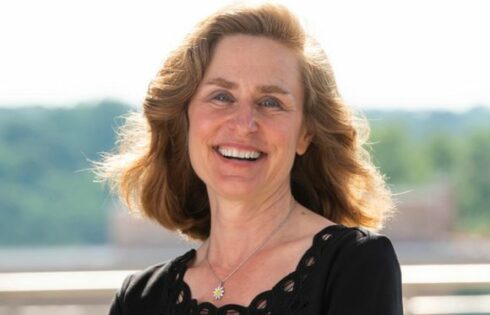 When President George H. W. Bush asked Condoleezza Rice, his director of Soviet Affairs in the National Security Council, to show Stanford University to Mikhail Gorbachev, a thought suddenly flashed across her mind:
When President George H. W. Bush asked Condoleezza Rice, his director of Soviet Affairs in the National Security Council, to show Stanford University to Mikhail Gorbachev, a thought suddenly flashed across her mind:
“Wow, I’m glad I changed my major.”
Today, Rice, a former professor and provost, has returned to Stanford, this time as a senior fellow at the Hoover Institution. She sat down with the Review at a conference table in her new office, relaxed and conversational.
Despite her successful ascent through government and international affairs work, Rice didn’t always plan to be a Soviet specialist and adviser to presidents. While official White House photography of the State of the Union address hangs on her walls, she just as prominently displays memorabilia from her hometown of Birmingham, Alabama.
Extraordinary, Ordinary People: A Memoir of Family, released on October 12, shares the former Secretary of State’s early years and the people who influenced her along the way. While the book covers her first exposure to Soviet studies – which didn’t happen until spring of her junior year of college – it also focuses on her parents, John and Angelena Rice, and an incredible community of teachers and role models in segregated Birmingham, Alabama.
Extraordinary, Ordinary People
What makes an ordinary person extraordinary? According to Rice, “One is the way that they take on their circumstances, and the second is the circumstances themselves,” echoing defenders of the George W. Bush Administration who point to cards dealt from September 11 to the financial crisis.
“And in my parents’ case, they were doing everything they did within the context of Jim Crow Alabama, segregated Alabama,” she said.
In fact, Rice was hardly the only one from her neighborhood to succeed, as she rattled off the tip of her tongue the names of university administrators, a prominent academic, and a national journalist, who was the first black woman to earn a national achievement scholarship.
“They produced these incredibly accomplished kids… and you have to think, how did they do that?” Rice said of the adults in her community. “Well, that’s the part that’s extraordinary. They somehow drew on strengths and values and principles that allowed them to have their little girl think, ‘Well, you might not be able to have a hamburger at Woolworth’s lunch counter, but you can be President of the United States if you want to.’”
Rice pointed to the commitment to education that her family and community emphasized. She recalled how nearly every adult in her neighborhood served as teachers in the area. Within this context, Rice also spoke of her paternal grandfather, who she referred to as an incredibly influential figure in her life even though he died shortly prior to her birth.
A physical representation of this influence came in the form of Rice’s graduation present after receiving her Ph.D. – a set of five leather bound, gold-embossed books of literature, which had been purchased at the height of the depression – much to Rice’s grandmother’s dismay.
Finding Your Passion
From an early age, Rice’s parents emphasized all kinds of learning, and she began studying piano at age 3. She continued playing into her college years, expecting to become a concert pianist. In fact, Rice attended the Aspen Music Festival and School in the summer of her sophomore year of college.
However, at the camp, she was surrounded by music prodigies and recalled realizing, “There were 12-year-olds who could play on sight what I had taken all year to learn. And I thought, ‘Oh, you’re going to teach 13-year-olds how to murder Beethoven or end up playing in a piano bar someplace.’”
In her junior year of college, after nearly two decades behind the piano, Rice decided to change her major.
“I used to always tell that story as provost because I know there are a lot of students who come in and they’re going to be an engineer, and suddenly, they’re not going to be an engineer,” she said. “And then there’s that moment of feeling lost and worthless because you can’t figure out what you want to do.”
After attempting English literature and state and local government, Rice took a class on international politics with Professor Josef Korbel, the father of future Secretary of State Madeleine Albright.
“He was a terrific Soviet specialist and he was a great storyteller,” she said. “He’d been a great diplomat and he was able to take his experience and all of a sudden this world of Soviet issues opened up to me.”
In recalling how she found her way to international politics, Rice emphasized the “possibility for serendipity to play a little bit of a role in your life.” She also spoke of the many times that students had asked her about how she ended up where she did, asking, “How do I get to do what you do?” Rice said she would reply, “Start as a failed piano major.”
She also advised the pursuit of a passion even if it may seem impractical or unexpected. “Go with it,” she said. “Don’t be afraid to do something unconventional.”
“There was no reason that a black girl from Birmingham, Alabama should be a Soviet specialist,” she said. “If I’d thought about it in those terms, I probably wouldn’t have become one.”
Back on the Farm
After her eight long years in the White House, Rice described herself as “ready to leave.” When asked by friends about how long it took her to “decompress,” she recalled responding, “Well, President Obama said ‘I do solemnly swear,’ and I was done.”
Rice has now settled back into her life as an academic with an office in the Hoover Institution, courses with MBA students and undergraduates, and significant written work. The transition back appears to have been smooth and natural. When asked about her decision to return to Stanford, Rice said it was easy.
“It had never occurred to me to do anything but come back to Stanford,” she said. “It wasn’t as if I’d made a decision. Always assumed I’d come back to Stanford.”
Arriving back at her home of so many years, she quickly felt back in place. “Almost from the day I got back, I felt almost like I’d never left.”
That said, Rice did acknowledge changes at a school with which she has been affiliated since 1981.
“I think Stanford has changed for the better,” she said, speaking of a renewed service focus among the student body. “I think there’s a really strong sense [among students] of wanting to do something bigger than yourself.”
Some similarities still remain. Rice spoke of how the first class she taught at Stanford, a seminar on civil military relations, was left off of the class listings. Today, she may no longer be a new assistant professor, but her courses are again absent from some listings. “Little different rationale,” she noted with a chuckle.
Up Next
More memoir work is to be expected from Rice after the publication of Extraordinary, Ordinary People. In another year or so, she will release a second memoir which will chronicle her time in the Bush Administration from 2001 through 2009. When asked about the choice to publish her childhood story first, she said that her later years would be difficult to understand without laying out her origins.
“How did I become who I am?” Rice says she has always responded, “You had to know John and Angelena Rice.”
Extraordinary, Ordinary People offers the opportunity to do just that.
Alex Katz and Tim Ford are staff writers for the Stanford Review, and blog at Fiat Lux. They are members of the Student Free Press Association.
Like The College Fix on Facebook / Follow us on Twitter





Please join the conversation about our stories on Facebook, Twitter, Instagram, Reddit, MeWe, Rumble, Gab, Minds and Gettr.